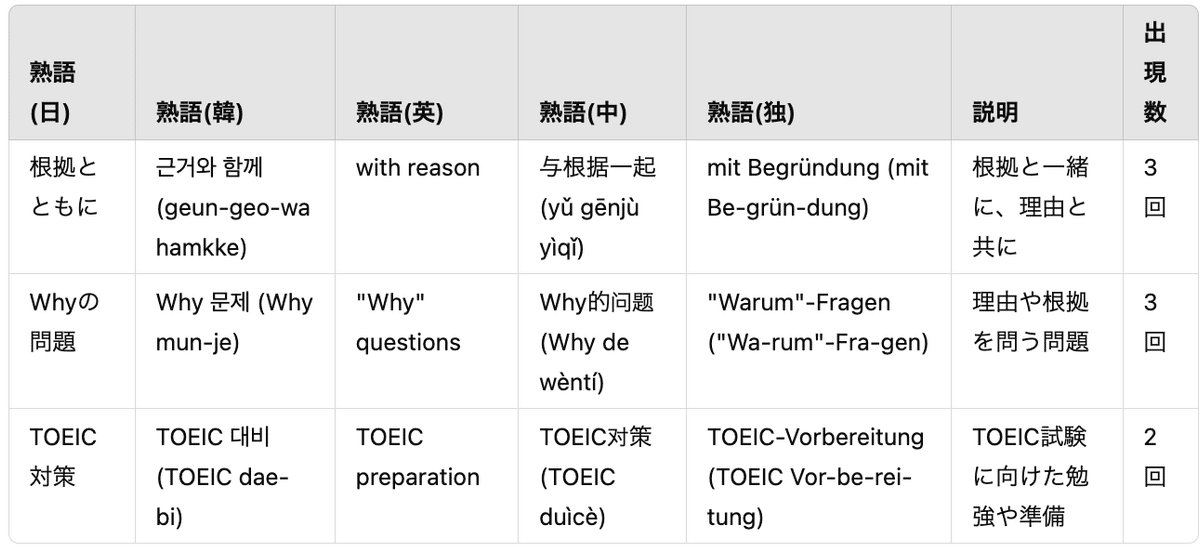
【DAY33】英語力以上に大切な『根拠思考』〜AIで進化する語学学習記〜
根拠とともに生きる
普段から「根拠」を求める人と、そうでない人がいる。ある日、私は友人のSからこんな話を聞いた。
「有名人が動画で話していることは、そのまま信じてるんだ。わざわざ根拠を調べたりはしないよ。」
その言葉に、私は少し驚いた。彼は著名人の主張を無条件に受け入れているように思えた。
別の日、ある本を読んでいたら、「多くの人が事実と意見を混同している」と書かれていた。この主張について詳しく知りたい人は、その本を手に取ってみるといい。
最近、私はTOEIC対策の記事を書いている。800点や900点で伸び悩む人たちについて考えると、彼らの問題は英語力そのものではないのではないかと思う。なぜなら、TOEICのリスニング(Part3やPart4)では、5W1Hの中でも「Why」のように根拠を問う問題が多く出題されるからだ。
「Why」の問題が解けなければ、高得点は難しい。逆に、これらの問題が解ければ、800点や900点は容易に達成できる。推論や次に何をするかのネクストアクションも頻繁に問われる。
普段から根拠について考える習慣がなければ、「Why」の問題を解くのは厳しい。しかし、日常的に根拠を意識していれば、英語を勉強することで高得点をすんなりと超えられると感じる。
ところで、根拠とは、相手の主張を聞くときに、その主張の理由も一緒に尋ねることだ。自分が何かを主張するときも、根拠とともに伝えることが大切である。
つまり、普段から主張と根拠をセットで考えることが、大切なのだ。
Living with Reason
There are people who always seek "reasons," and those who do not. One day, my friend Shota told me something.
"I believe what famous people say in videos as it is. I don't bother checking for reasons."
I was a bit surprised by his words. It seemed he was accepting the claims of celebrities unconditionally.
On another day, while reading a book, I found the line, "Many people confuse facts with opinions." If you're interested in this assertion, you should pick up that book.
Recently, I've been writing articles for TOEIC preparation. When I think about people struggling to improve from 800 to 900 points, I wonder if their problem isn't their English ability itself. This is because, in TOEIC listening (Part 3 and Part 4), many questions ask for reasons like "Why" among the 5W1H.
If you can't solve "Why" questions, achieving a high score is difficult. Conversely, if you can answer these questions, reaching 800 or 900 points is easy. Inferences and next actions are also frequently asked.
Without the habit of thinking about reasons regularly, it's tough to answer "Why" questions. However, if you are conscious of reasons in your daily life, you can easily surpass high scores by studying English.
By the way, seeking reasons means asking for the rationale behind someone's claim when you hear it. When you make a claim yourself, it's important to convey it along with the reason.
In other words, it's essential to always consider claims and reasons together.
근거와 함께 사는 삶
(Geun-geo-wa hamkke saneun salm)
사람들 중에는 평소에 "근거"를 구하는 사람과 그렇지 않은 사람이 있습니다. 어느 날, 친구 쇼타로부터 이런 말을 들었습니다.
"유명인이 영상에서 말하는 것을 그대로 믿어. 굳이 근거를 찾아보진 않아."
그의 말에 저는 조금 놀랐습니다. 그는 저명인의 주장을 무조건적으로 받아들이는 것처럼 보였습니다.
다른 날, 어떤 책을 읽다가 "많은 사람들이 사실과 의견을 혼동하고 있다"는 문장을 발견했습니다. 이 주장에 관심이 있는 분들은 그 책을 한 번 읽어보시길 바랍니다.
최근 저는 TOEIC 대비 기사를 쓰고 있습니다. 800점이나 900점에서 성적이 오르지 않는 사람들을 생각하면, 그들의 문제는 영어 실력 그 자체가 아닐지도 모른다고 생각합니다. 왜냐하면 TOEIC 리스닝(Part3와 Part4)에서는 5W1H 중에서도 "왜(Why)"처럼 근거를 묻는 문제가 많이 출제되기 때문입니다.
"왜" 문제를 풀지 못하면 고득점은 어렵습니다. 반대로 이러한 문제를 풀 수 있으면 800점이나 900점은 쉽게 달성할 수 있습니다. 추론이나 다음에 무엇을 할지에 대한 네트스트 액션도 자주 묻습니다.
평소에 근거에 대해 생각하는 습관이 없으면 "왜" 문제를 풀기 어렵습니다. 그러나 일상적으로 근거를 의식한다면 영어를 공부하여 고득점을 쉽게 넘을 수 있다고 느낍니다.
그런데 근거란 상대방의 주장을 들을 때 그 주장의 이유도 함께 묻는 것입니다. 자신이 무엇을 주장할 때도 근거와 함께 전달하는 것이 중요합니다.
즉, 평소에 주장과 근거를 함께 생각하는 것이 중요합니다。
与根据同行
(Yǔ gēnjù tóngxíng)
有些人平时会追求“根据”,有些人则不会。一天,我的朋友翔太告诉了我一些事情。
“我直接相信名人在视频中说的话。不刻意去查找根据。”
他的言论让我有些惊讶。他似乎无条件地接受了名人的主张。
另一天,我在读一本书时,发现了这样一句话:“许多人混淆了事实和意见。”如果你对这个主张感兴趣,可以去看看那本书。
最近,我一直在写TOEIC(托业)对策的文章。想到那些在800分、900分徘徊的人,我认为他们的问题可能不在于英语能力本身。因为在TOEIC的听力(Part3和Part4)中,5W1H的问题里,像“为什么(Why)”这样询问根据的问题很多。
如果不能解答“为什么”的问题,拿高分是困难的。反之,如果能回答这些问题,800分、900分就容易达到。推理题或下一步要做什么的Next Action也经常被问到。
如果平时没有思考根据的习惯,解答“为什么”的问题是困难的。然而,如果在日常生活中意识到根据,通过学习英语,就能轻松地取得高分。
顺便说一下,根据就是在听取他人主张时,一起询问其主张的理由。自己主张某事时,也要连同根据一起传达。
也就是说,平时将主张和根据一起思考是很重要的。
Leben mit Begründung
Es gibt Menschen, die immer nach "Begründungen" suchen, und solche, die es nicht tun. Eines Tages erzählte mir mein Freund Shota Folgendes:
"Ich glaube direkt, was berühmte Leute in Videos sagen. Ich suche nicht extra nach Begründungen."
Seine Worte überraschten mich ein wenig. Es schien, als würde er die Behauptungen von Prominenten bedingungslos akzeptieren.
An einem anderen Tag las ich in einem Buch den Satz: "Viele Menschen verwechseln Tatsachen mit Meinungen." Wenn Sie an dieser Aussage interessiert sind, sollten Sie dieses Buch lesen.
In letzter Zeit schreibe ich Artikel zur TOEIC-Vorbereitung. Wenn ich an Menschen denke, die bei 800 oder 900 Punkten stagnieren, frage ich mich, ob ihr Problem nicht die Englischkenntnisse selbst sind. Denn im TOEIC-Hörverstehen (Teil 3 und Teil 4) werden viele Fragen gestellt, die nach Begründungen wie "Warum" unter den 5W1H fragen.
Wenn man die "Warum"-Fragen nicht lösen kann, ist es schwierig, eine hohe Punktzahl zu erreichen. Umgekehrt ist es einfach, 800 oder 900 Punkte zu erzielen, wenn man diese Fragen beantworten kann. Schlussfolgerungen oder die nächste Aktion werden ebenfalls häufig gefragt.
Ohne die Gewohnheit, regelmäßig über Begründungen nachzudenken, ist es hart, die "Warum"-Fragen zu beantworten. Wenn man jedoch im Alltag auf Begründungen achtet, kann man durch das Lernen von Englisch leicht hohe Punktzahlen erreichen.
Übrigens bedeutet Begründung, dass man beim Hören der Aussagen anderer auch nach den Gründen für diese Aussagen fragt. Wenn man selbst etwas behauptet, ist es wichtig, es zusammen mit der Begründung zu vermitteln.
Mit anderen Worten, es ist wichtig, im Alltag Behauptungen immer zusammen mit ihren Begründungen zu betrachten。
AIのフィードバック
K(Keep:良かった点)
明確なテーマとメッセージ:日常生活における「根拠」の重要性を一貫して強調しており、読者に対して明確なメッセージを伝えています。
具体的な例の使用:友人との会話やTOEICの例を挙げることで、抽象的な概念を具体化し、読者が理解しやすくなっています。
結論での強調:最後に「主張と根拠をセットで考えること」の大切さを再度述べることで、エッセイ全体の主旨を効果的にまとめています。
P(Problem:改善が望まれる点)
具体性の不足:友人のエピソードや読んだ本についての詳細が少なく、読者が状況をイメージしにくい部分があります。
論理的なつながりの弱さ:TOEICのスコアと「根拠」を考える習慣との関連性が十分に説明されておらず、説得力に欠ける印象があります。
段落間のつながりがぎこちない:話題の移行が急で、文章の流れがスムーズでないため、読み手が戸惑う可能性があります。
T(Try:次回試してほしい点)
エピソードの詳細な描写を追加する:友人との具体的な会話内容や、読んだ本のタイトルとその主張を紹介することで、読者の共感を得やすくなります。
論理的な関連性を強化する:TOEICの例を用いる際に、「根拠」を考える習慣がスコア向上にどう影響するのかを具体的に説明してみてください。
段落間のつなぎを改善する:適切な接続詞やフレーズを使用して、各段落が自然につながるように工夫すると、文章全体の読みやすさが向上します。
K (Keep: Positive Aspects)
Clear theme and message: The essay consistently emphasizes the importance of considering "reasons" or "evidence" in daily life, effectively conveying a clear message to the reader.
Use of specific examples: By mentioning a conversation with a friend and examples from the TOEIC test, abstract concepts are made concrete, enhancing reader understanding.
Strong emphasis in the conclusion: Restating the importance of thinking about claims and reasons together effectively summarizes the main point of the essay.
P (Problem: Areas for Improvement)
Lack of detail in anecdotes: The essay provides minimal details about the friend's story and the book read, making it difficult for readers to visualize the situations.
Weak logical connections: The relationship between TOEIC scores and the habit of considering "reasons" isn't fully explained, which may reduce the essay's persuasiveness.
Awkward transitions between paragraphs: Abrupt topic shifts disrupt the flow, potentially causing confusion for the reader.
T (Try: Suggestions for Next Time)
Add detailed descriptions to anecdotes: Including specific dialogue with the friend and mentioning the book's title and its arguments can help readers relate more deeply.
Strengthen logical relationships: When using the TOEIC example, clearly explain how the habit of considering "reasons" directly impacts score improvement.
Improve transitions between paragraphs: Use appropriate conjunctions and phrases to ensure each paragraph flows naturally into the next, enhancing overall readability.
学ぶ
1.頻出単語

2. 頻出熟語

3. 頻出構文

